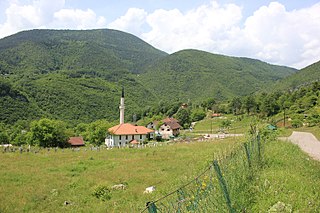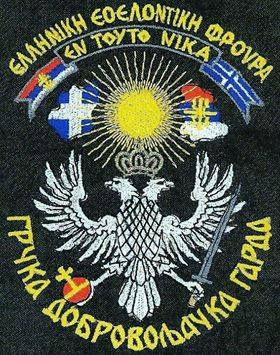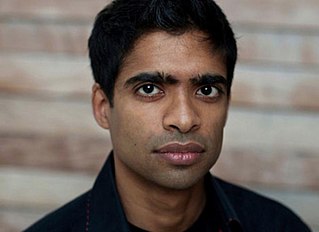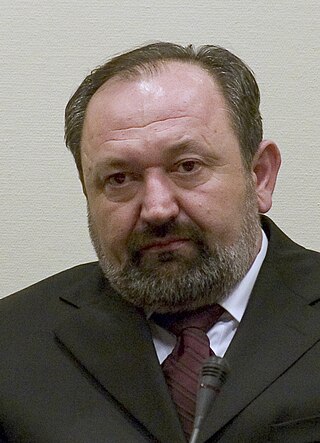
Srebrenica is a town and municipality in Republika Srpska, Bosnia and Herzegovina. It is a small mountain town, with its main industry being salt mining and a nearby spa.

This Pulitzer Prize has been awarded since 1942 for a distinguished example of reporting on international affairs, including United Nations correspondence. In its first six years (1942–1947), it was called the Pulitzer Prize for Telegraphic Reporting - International.

The Christian Science Monitor (CSM), commonly known as The Monitor, is a nonprofit news organization that publishes daily articles both in electronic format and a weekly print edition. It was founded in 1908 as a daily newspaper by Mary Baker Eddy, the founder of the Church of Christ, Scientist.

The Bosnian War was an international armed conflict that took place in Bosnia and Herzegovina between 1992 and 1995. The war is commonly seen as having started on 6 April 1992, following a number of earlier violent incidents. The war ended on 14 December 1995 when the Dayton accords were signed. The main belligerents were the forces of the Republic of Bosnia and Herzegovina, the Republic of Herzeg-Bosnia, and the Republika Srpska, the latter two entities being proto-states led and supplied by Croatia and Serbia, respectively.

The Srebrenica massacre, also known as the Srebrenica genocide, was the July 1995 genocidal killing of more than 8,000 Bosniak Muslim men and boys in and around the town of Srebrenica, during the Bosnian War. The killings were perpetrated by units of the Bosnian Serb Army of Republika Srpska (VRS) under the command of Ratko Mladić. The Scorpions, a paramilitary unit from Serbia, who had been part of the Serbian Interior Ministry until 1991, also participated in the massacre.
Winners of the Pulitzer Prizes for 1996 were:

The Bosnian genocide refers to either the Srebrenica massacre or the wider crimes against humanity and ethnic cleansing campaign throughout areas controlled by the Army of Republika Srpska (VRS) during the Bosnian War of 1992–1995. The events in Srebrenica in 1995 included the killing of more than 8,000 Bosniak men and boys, as well as the mass expulsion of another 25,000–30,000 Bosniak civilians by VRS units under the command of General Ratko Mladić.

Operation Deliberate Force was a sustained air campaign conducted by the North Atlantic Treaty Organization (NATO), in concert with the United Nations Protection Force (UNPROFOR) ground operations, to undermine the military capability of the Army of Republika Srpska (VRS), which had threatened and attacked UN-designated "safe areas" in Bosnia and Herzegovina during the Bosnian War with the Srebrenica genocide and Markale massacres, precipitating the intervention. The shelling of the Sarajevo marketplace on 28 August 1995 by the VRS is considered to be the immediate instigating factor behind NATO's decision to launch the operation.

The Republika Srpska was a self-proclaimed statelet in Southeastern Europe under the control of the Army of Republika Srpska during the Bosnian War. It claimed to be a sovereign state, though this claim was only partially recognized by the Bosnian government in the Geneva agreement, the United Nations, and FR Yugoslavia. For the first six months of its existence, it was known as the Serbian Republic of Bosnia and Herzegovina.

Žepa is a village located in the municipality of Rogatica, Republika Srpska, Bosnia and Herzegovina. As of 2013 census, it has a population of 133 inhabitants. It is situated northeast of Rogatica itself on the banks of short river with a same name, the Žepa river, which flows into the Drina river nearby, in a valley between the mountains Javor and Devetak.

Stephen Farrell is a journalist who works for Reuters news agency. He holds both Irish and British citizenship. Farrell worked for The Times from 1995 to 2007, reporting from Kosovo, India, Afghanistan and the Middle East, including Iraq. In 2007, he joined The New York Times, and reported from the Middle East, Afghanistan and Libya, later moving to New York and London. In 2017 he joined Reuters, working as bureau chief in Jerusalem until Jan. 2022. He then worked in Ukraine and is now based in London.

The siege of Srebrenica was a three-year siege of the town of Srebrenica in eastern Bosnia and Herzegovina which lasted from April 1992 to July 1995 during the Bosnian War. Initially assaulted by the Yugoslav People's Army (JNA) and the Serbian Volunteer Guard (SDG), the town was encircled by the Army of Republika Srpska (VRS) in May 1992, starting a brutal siege which was to last for the majority of the Bosnian War. In June 1995, the commander of the Army of the Republic of Bosnia and Herzegovina (ARBiH) in the enclave, Naser Orić, left Srebrenica and fled to the town of Tuzla. He was subsequently replaced by his deputy, Major Ramiz Bećirović.

The Greek Volunteer Guard was a unit of Greek volunteers that fought in the Bosnian War on the side of the Army of the Republika Srpska. Some members of the unit are alleged to have been present in the area of the Srebrenica massacre and reportedly hoisted a Greek flag over the town, which was recorded 'for marketing purposes'.
David Stephenson Rohde, a journalist for The New York Times, and two associates were kidnapped by members of the Taliban in November 2008. Rohde was in Afghanistan doing research for a book. After being held captive for eight months, in June 2009, Rohde and one of his associates escaped and made their way to safety.

Report about Case Srebrenica (the first part) was a controversial official report on the July 1995 Srebrenica massacre in eastern Bosnia and Herzegovina. It was prepared by Darko Trifunović and published by the Republika Srpska Government Bureau for Relations with the International Criminal Tribunal for the Former Yugoslavia (ICTY).

Eric P. Schmitt is an American journalist who writes for The New York Times. He has shared four Pulitzer Prizes.

Anand Gopal is a writer for The New Yorker magazine and author of No Good Men Among the Living: America, the Taliban and the War Through Afghan Eyes, which describes the travails of three Afghans caught in the war on terror. It was a finalist for the 2015 Pulitzer Prize for general non-fiction and the 2014 National Book Award for non-fiction. He has won many major journalism prizes, including the National Magazine Award, for his magazine writing on conflict in the Middle East.

Vujadin Popović is a Bosnian Serb war criminal, who participated in the War in Bosnia and Herzegovina and was convicted of genocide, extermination, murder and persecution and sentenced to life in prison. He was Lieutenant Colonel and the Chief of Security of the Drina Corps of the Army of Republika Srpska.

Bosnian genocide denial is the act of denying the occurrence of the systematic Bosnian genocide against the Bosniak Muslim population of Bosnia and Herzegovina, or asserting it did not occur in the manner or to the extent that has been established by the International Criminal Tribunal for the former Yugoslavia (ICTY) and the International Court of Justice (ICJ) through proceedings and judgments, and described by comprehensive scholarship.



















